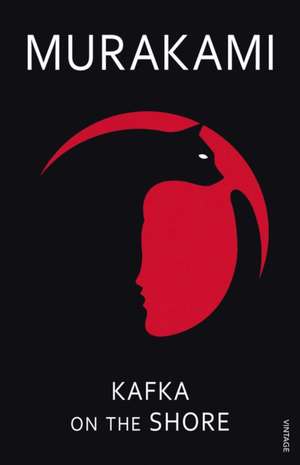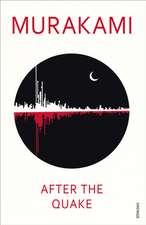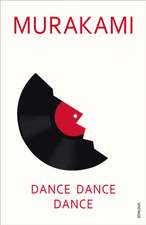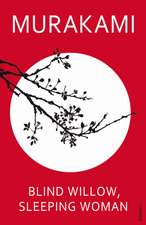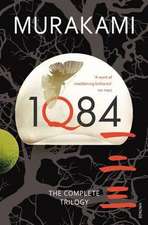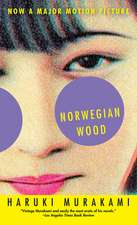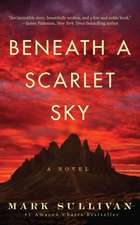Kafka on the Shore
Autor Haruki Murakamien Limba Engleză Paperback – 6 oct 2005
Cats converse with people; fish tumble from the sky; a ghostlike pimp deploys a Hegel-spouting girl of the night; a forest harbours soldiers apparently un-aged since WWII. There is a savage killing, but the identity of both victim and killer is a riddle. Murakami's new novel is at once a classic tale of quest, but it is also a bold exploration of mythic and contemporary taboos, of patricide, of mother-love, of sister-love. Above all it is an entertainment of a very high order.
| Toate formatele și edițiile | Preț | Express |
|---|---|---|
| Paperback (5) | 57.46 lei 24-35 zile | +27.70 lei 7-11 zile |
| Random House – 6 oct 2005 | 57.46 lei 24-35 zile | +27.70 lei 7-11 zile |
| Random House – 6 oct 2005 | 57.84 lei 24-35 zile | +35.01 lei 7-11 zile |
| Random House LLC US – oct 2005 | 63.10 lei 3-5 săpt. | +11.10 lei 7-11 zile |
| Random House LLC US – 2006 | 96.55 lei 3-5 săpt. | +16.60 lei 7-11 zile |
| Vintage Publishing – 7 mai 2026 | 78.71 lei Precomandă | |
| Hardback (1) | 139.74 lei 3-5 săpt. | +27.45 lei 7-11 zile |
| Random House – 4 aug 2022 | 139.74 lei 3-5 săpt. | +27.45 lei 7-11 zile |
Preț: 57.46 lei
Preț vechi: 70.17 lei
-18%
Puncte Express: 86
Preț estimativ în valută:
10.16€ • 11.99$ • 8.90£
10.16€ • 11.99$ • 8.90£
Carte disponibilă
Livrare economică 27 martie-07 aprilie
Livrare express 10-14 martie pentru 37.69 lei
Specificații
ISBN-13: 9780099494096
ISBN-10: 0099494094
Pagini: 624
Dimensiuni: 110 x 176 x 48 mm
Greutate: 0.34 kg
Editura: Random House
Colecția Vintage
ISBN-10: 0099494094
Pagini: 624
Dimensiuni: 110 x 176 x 48 mm
Greutate: 0.34 kg
Editura: Random House
Colecția Vintage
Notă biografică
In 1978, Haruki Murakami was 29 and running a jazz bar in downtown Tokyo. One April day, the impulse to write a novel came to him suddenly while watching a baseball game. That first novel, Hear the Wind Sing, won a new writers¿ award and was published the following year. More followed, including A Wild Sheep Chase and Hard-Boiled Wonderland and the End of the World, but it was Norwegian Wood, published in 1987, which turned Murakami from a writer into a phenomenon. His books became bestsellers, were translated into many languages, including English, and the door was thrown wide open to Murakami¿s unique and addictive fictional universe.
Murakami writes with admirable discipline, producing ten pages a day, after which he runs ten kilometres (he began long-distance running in 1982 and has participated in numerous marathons and races), works on translations, and then reads, listens to records and cooks. His passions colour his non-fiction output, from What I Talk About When I Talk About Running to Absolutely On Music, and they also seep into his novels and short stories, providing quotidian moments in his otherwise freewheeling flights of imaginative inquiry. In works such as The Wind-Up Bird Chronicle, 1Q84 and Men Without Women, his distinctive blend of the mysterious and the everyday, of melancholy and humour, continues to enchant readers, ensuring Murakami¿s place as one of the world¿s most acclaimed and well-loved writers.
Murakami writes with admirable discipline, producing ten pages a day, after which he runs ten kilometres (he began long-distance running in 1982 and has participated in numerous marathons and races), works on translations, and then reads, listens to records and cooks. His passions colour his non-fiction output, from What I Talk About When I Talk About Running to Absolutely On Music, and they also seep into his novels and short stories, providing quotidian moments in his otherwise freewheeling flights of imaginative inquiry. In works such as The Wind-Up Bird Chronicle, 1Q84 and Men Without Women, his distinctive blend of the mysterious and the everyday, of melancholy and humour, continues to enchant readers, ensuring Murakami¿s place as one of the world¿s most acclaimed and well-loved writers.
Extras
Cash isn't the only thing I take from my father's study when I leave home. I take a small, old gold lighter--I like the design and feel of it--and a folding knife with a really sharp blade. Made to skin deer, it has a five-inch blade and a nice heft. Probably something he bought on one of his trips abroad. I also take a sturdy, bright pocket flashlight out of a drawer. Plus sky blue Revo sunglasses to disguise my age.
I think about taking my father's favorite Sea-Dweller Oyster Rolex. It's a beautiful watch, but something flashy will only attract attention. My cheap plastic Casio watch with an alarm and stopwatch will do just fine, and might actually be more useful. Reluctantly, I return the Rolex to its drawer.
From the back of another drawer I take out a photo of me and my older sister when we were little, the two of us on a beach somewhere with grins plastered across our faces. My sister's looking off to the side so half her face is in shadow and her smile is neatly cut in half. It's like one of those Greek tragedy masks in a textbook that's half one idea and half the opposite. Light and dark. Hope and despair. Laughter and sadness. Trust and loneliness. For my part I'm staring straight ahead, undaunted, at the camera. Nobody else is there at the beach. My sister and I have on swimsuits--hers a red floral-print one-piece, mine some baggy old blue trunks. I'm holding a plastic stick in my hand. White foam is washing over our feet.
Who took this, and where and when, I have no clue. And how could I have looked so happy? And why did my father keep just that one photo? The whole thing is a total mystery. I must have been three, my sister nine. Did we ever really get along that well? I have no memory of ever going to the beach with my family. No memory of going anywhere with them. No matter, though--there is no way I'm going to leave that photo with my father, so I put it in my wallet. I don't have any photos of my mother. My father had thrown them all away.
After giving it some thought I decide to take the cell phone with me. Once he finds out I've taken it, my father will probably get the phone company to cut off service. Still, I toss it into my backpack, along with the adapter. Doesn't add much weight, so why not. When it doesn't work anymore I'll just chuck it.
Just the bare necessities, that's all I need. Choosing which clothes to take is the hardest thing. I'll need a couple sweaters and pairs of underwear. But what about shirts and trousers? Gloves, mufflers, shorts, a coat? There's no end to it. One thing I do know, though. I don't want to wander around some strange place with a huge backpack that screams out, Hey, everybody, check out the runaway! Do that and someone is sure to sit up and take notice. Next thing you know the police will haul me in and I'll be sent straight home. If I don't wind up in some gang first.
Any place cold is definitely out, I decide. Easy enough, just choose the opposite--a warm place. Then I can leave the coat and gloves behind, and get by with half the clothes. I pick out wash-and-wear-type things, the lightest ones I have, fold them neatly, and stuff them in my backpack. I also pack a three-season sleeping bag, the kind that rolls up nice and tight, toilet stuff, a rain poncho, notebook and pen, a Walkman and ten discs--got to have my music--along with a spare rechargeable battery. That's about it. No need for any cooking gear, which is too heavy and takes up too much room, since I can buy food at the local convenience store.
It takes a while but I'm able to subtract a lot of things from my list. I add things, cross them off, then add a whole other bunch and cross them off, too.
My fifteenth birthday is the ideal time to run away from home. Any earlier and it'd be too soon. Any later and I would have missed my chance.
During my first two years in junior high, I'd worked out, training myself for this day. I started practicing judo in the first couple years of grade school, and still went sometimes in junior high. But I didn't join any school teams. Whenever I had the time I'd jog around the school grounds, swim, or go to the local gym. The young trainers there gave me free lessons, showing me the best kind of stretching exercises and how to use the fitness machines to bulk up. They taught me which muscles you use every day and which ones can only be built up with machines, even the correct way to do a bench press. I'm pretty tall to begin with, and with all this exercise I've developed pretty broad shoulders and pecs. Most strangers would take me for seventeen. If I ran away looking my actual age, you can imagine all the problems that would cause.
Other than the trainers at the gym and the housekeeper who comes to our house every other day--and of course the bare minimum required to get by at school--I barely talk to anyone. For a long time my father and I have avoided seeing each other. We live under the same roof, but our schedules are totally different. He spends most of his time in his studio, far away, and I do my best to avoid him.
The school I'm going to is a private junior high for kids who are upper-class, or at least rich. It's the kind of school where, unless you really blow it, you're automatically promoted to the high school on the same campus. All the students dress neatly, have nice straight teeth, and are boring as hell. Naturally I have zero friends. I've built a wall around me, never letting anybody inside and trying not to venture outside myself. Who could like somebody like that? They all keep an eye on me, from a distance. They might hate me, or even be afraid of me, but I'm just glad they didn't bother me. Because I had tons of things to take care of, including spending a lot of my free time devouring books in the school library.
I always paid close attention to what was said in class, though. Just like the boy named Crow suggested.
The facts and techniques or whatever they teach you in class isn't going to be very useful in the real world, that's for sure. Let's face it, teachers are basically a bunch of morons. But you've got to remember this: you're running away from home. You probably won't have any chance to go to school anymore, so like it or not you'd better absorb whatever you can while you've got the chance. Become like a sheet of blotting paper and soak it all in. Later on you can figure out what to keep and what to unload.
I did what he said, like I almost always do. My brain like a sponge, I focused on every word said in class and let it all sink in, figured out what it meant, and committed everything to memory. Thanks to this, I barely had to study outside of class, but always came out near the top on exams.
My muscles were getting hard as steel, even as I grew more withdrawn and quiet. I tried hard to keep my emotions from showing so that no one--classmates and teachers alike--had a clue what I was thinking. Soon I'd be launched into the rough adult world, and I knew I'd have to be tougher than anybody if I wanted to survive.
My eyes in the mirror are cold as a lizard's, my expression fixed and unreadable. I can't remember the last time I laughed or even showed a hint of a smile to other people. Even to myself.
I'm not trying to imply I can keep up this silent, isolated facade all the time. Sometimes the wall I've erected around me comes crumbling down. It doesn't happen very often, but sometimes, before I even realize what's going on, there I am--naked and defenseless and totally confused. At times like that I always feel an omen calling out to me, like a dark, omnipresent pool of water.
A dark, omnipresent pool of water.
It was probably always there, hidden away somewhere. But when the time comes it silently rushes out, chilling every cell in your body. You drown in that cruel flood, gasping for breath. You cling to a vent near the ceiling, struggling, but the air you manage to breathe is dry and burns your throat. Water and thirst, cold and heat--these supposedly opposite elements combine to assault you.
The world is a huge space, but the space that will take you in--and it doesn't have to be very big--is nowhere to be found. You seek a voice, but what do you get? Silence. You look for silence, but guess what? All you hear over and over and over is the voice of this omen. And sometimes this prophetic voice pushes a secret switch hidden deep inside your brain.
Your heart is like a great river after a long spell of rain, full to the banks. All signposts that once stood on the ground are gone, inundated and carried away by that rush of water. And still the rain beats down on the surface of the river. Every time you see a flood like that on the news you tell yourself: That's it. That's my heart.
Before running away from home I wash my hands and face, trim my nails, swab out my ears, and brush my teeth. I take my time, making sure my whole body's well scrubbed. Being really clean is sometimes the most important thing there is. I gaze carefully at my face in the mirror. Genes I'd gotten from my father and mother--not that I have any recollection of what she looked like--created this face. I can do my best to not let any emotions show, keep my eyes from revealing anything, bulk up my muscles, but there's not much I can do about my looks. I'm stuck with my father's long, thick eyebrows and the deep lines between them. I could probably kill him if I wanted to--I'm sure strong enough--and I can erase my mother from my memory. But there's no way to erase the DNA they passed down to me. If I wanted to drive that away I'd have to get rid of me.
There's an omen contained in that. A mechanism buried inside of me.
A mechanism buried inside of you.
I switch off the light and leave the bathroom. A heavy, damp stillness lies over the house. The whispers of people who don't exist, the breath of the dead. I look around, standing stock-still, and take a deep breath. The clock shows three p.m., the two hands cold and distant. They're pretending to be noncommittal, but I know they're not on my side. It's nearly time for me to say good-bye. I pick up my backpack and slip it over my shoulders. I've carried it any number of times, but now it feels so much heavier.
Shikoku, I decide. That's where I'll go. There's no particular reason it has to be Shikoku, only that studying the map I got the feeling that's where I should head. The more I look at the map--actually every time I study it--the more I feel Shikoku tugging at me. It's far south of Tokyo, separated from the mainland by water, with a warm climate. I've never been there, have no friends or relatives there, so if somebody started looking for me--which I kind of doubt--Shikoku would be the last place they'd think of.
I pick up the ticket I'd reserved at the counter and climb aboard the night bus. This is the cheapest way to get to Takamatsu--just a shade over ninety bucks. Nobody pays me any attention, asks how old I am, or gives me a second look. The bus driver mechanically checks my ticket.
Only a third of the seats are taken. Most passengers are traveling alone, like me, and the bus is strangely silent. It's a long trip to Takamatsu, ten hours according to the schedule, and we'll be arriving early in the morning. But I don't mind. I've got plenty of time. The bus pulls out of the station at eight, and I push my seat back. No sooner do I settle down than my consciousness, like a battery that's lost its charge, starts to fade away, and I fall asleep.
Sometime in the middle of the night a hard rain begins to fall. I wake up every once in a while, part the chintzy curtain at the window, and gaze out at the highway rushing by. Raindrops beat against the glass, blurring streetlights alongside the road that stretch off into the distance at identical intervals like they were set down to measure the earth. A new light rushes up close and in an instant fades off behind us. I check my watch and see it's past midnight. Automatically shoved to the front, my fifteenth birthday makes its appearance.
Hey, happy birthday, the boy named Crow says.
Thanks, I reply.
The omen is still with me, though, like a shadow. I check to make sure the wallaround me is still in place. Then I close the curtain and fall back asleep.
*********
Visit Haruki Murakami's official website to read more from Kafka on the Shore.
www.harukimurakami.com
I think about taking my father's favorite Sea-Dweller Oyster Rolex. It's a beautiful watch, but something flashy will only attract attention. My cheap plastic Casio watch with an alarm and stopwatch will do just fine, and might actually be more useful. Reluctantly, I return the Rolex to its drawer.
From the back of another drawer I take out a photo of me and my older sister when we were little, the two of us on a beach somewhere with grins plastered across our faces. My sister's looking off to the side so half her face is in shadow and her smile is neatly cut in half. It's like one of those Greek tragedy masks in a textbook that's half one idea and half the opposite. Light and dark. Hope and despair. Laughter and sadness. Trust and loneliness. For my part I'm staring straight ahead, undaunted, at the camera. Nobody else is there at the beach. My sister and I have on swimsuits--hers a red floral-print one-piece, mine some baggy old blue trunks. I'm holding a plastic stick in my hand. White foam is washing over our feet.
Who took this, and where and when, I have no clue. And how could I have looked so happy? And why did my father keep just that one photo? The whole thing is a total mystery. I must have been three, my sister nine. Did we ever really get along that well? I have no memory of ever going to the beach with my family. No memory of going anywhere with them. No matter, though--there is no way I'm going to leave that photo with my father, so I put it in my wallet. I don't have any photos of my mother. My father had thrown them all away.
After giving it some thought I decide to take the cell phone with me. Once he finds out I've taken it, my father will probably get the phone company to cut off service. Still, I toss it into my backpack, along with the adapter. Doesn't add much weight, so why not. When it doesn't work anymore I'll just chuck it.
Just the bare necessities, that's all I need. Choosing which clothes to take is the hardest thing. I'll need a couple sweaters and pairs of underwear. But what about shirts and trousers? Gloves, mufflers, shorts, a coat? There's no end to it. One thing I do know, though. I don't want to wander around some strange place with a huge backpack that screams out, Hey, everybody, check out the runaway! Do that and someone is sure to sit up and take notice. Next thing you know the police will haul me in and I'll be sent straight home. If I don't wind up in some gang first.
Any place cold is definitely out, I decide. Easy enough, just choose the opposite--a warm place. Then I can leave the coat and gloves behind, and get by with half the clothes. I pick out wash-and-wear-type things, the lightest ones I have, fold them neatly, and stuff them in my backpack. I also pack a three-season sleeping bag, the kind that rolls up nice and tight, toilet stuff, a rain poncho, notebook and pen, a Walkman and ten discs--got to have my music--along with a spare rechargeable battery. That's about it. No need for any cooking gear, which is too heavy and takes up too much room, since I can buy food at the local convenience store.
It takes a while but I'm able to subtract a lot of things from my list. I add things, cross them off, then add a whole other bunch and cross them off, too.
My fifteenth birthday is the ideal time to run away from home. Any earlier and it'd be too soon. Any later and I would have missed my chance.
During my first two years in junior high, I'd worked out, training myself for this day. I started practicing judo in the first couple years of grade school, and still went sometimes in junior high. But I didn't join any school teams. Whenever I had the time I'd jog around the school grounds, swim, or go to the local gym. The young trainers there gave me free lessons, showing me the best kind of stretching exercises and how to use the fitness machines to bulk up. They taught me which muscles you use every day and which ones can only be built up with machines, even the correct way to do a bench press. I'm pretty tall to begin with, and with all this exercise I've developed pretty broad shoulders and pecs. Most strangers would take me for seventeen. If I ran away looking my actual age, you can imagine all the problems that would cause.
Other than the trainers at the gym and the housekeeper who comes to our house every other day--and of course the bare minimum required to get by at school--I barely talk to anyone. For a long time my father and I have avoided seeing each other. We live under the same roof, but our schedules are totally different. He spends most of his time in his studio, far away, and I do my best to avoid him.
The school I'm going to is a private junior high for kids who are upper-class, or at least rich. It's the kind of school where, unless you really blow it, you're automatically promoted to the high school on the same campus. All the students dress neatly, have nice straight teeth, and are boring as hell. Naturally I have zero friends. I've built a wall around me, never letting anybody inside and trying not to venture outside myself. Who could like somebody like that? They all keep an eye on me, from a distance. They might hate me, or even be afraid of me, but I'm just glad they didn't bother me. Because I had tons of things to take care of, including spending a lot of my free time devouring books in the school library.
I always paid close attention to what was said in class, though. Just like the boy named Crow suggested.
The facts and techniques or whatever they teach you in class isn't going to be very useful in the real world, that's for sure. Let's face it, teachers are basically a bunch of morons. But you've got to remember this: you're running away from home. You probably won't have any chance to go to school anymore, so like it or not you'd better absorb whatever you can while you've got the chance. Become like a sheet of blotting paper and soak it all in. Later on you can figure out what to keep and what to unload.
I did what he said, like I almost always do. My brain like a sponge, I focused on every word said in class and let it all sink in, figured out what it meant, and committed everything to memory. Thanks to this, I barely had to study outside of class, but always came out near the top on exams.
My muscles were getting hard as steel, even as I grew more withdrawn and quiet. I tried hard to keep my emotions from showing so that no one--classmates and teachers alike--had a clue what I was thinking. Soon I'd be launched into the rough adult world, and I knew I'd have to be tougher than anybody if I wanted to survive.
My eyes in the mirror are cold as a lizard's, my expression fixed and unreadable. I can't remember the last time I laughed or even showed a hint of a smile to other people. Even to myself.
I'm not trying to imply I can keep up this silent, isolated facade all the time. Sometimes the wall I've erected around me comes crumbling down. It doesn't happen very often, but sometimes, before I even realize what's going on, there I am--naked and defenseless and totally confused. At times like that I always feel an omen calling out to me, like a dark, omnipresent pool of water.
A dark, omnipresent pool of water.
It was probably always there, hidden away somewhere. But when the time comes it silently rushes out, chilling every cell in your body. You drown in that cruel flood, gasping for breath. You cling to a vent near the ceiling, struggling, but the air you manage to breathe is dry and burns your throat. Water and thirst, cold and heat--these supposedly opposite elements combine to assault you.
The world is a huge space, but the space that will take you in--and it doesn't have to be very big--is nowhere to be found. You seek a voice, but what do you get? Silence. You look for silence, but guess what? All you hear over and over and over is the voice of this omen. And sometimes this prophetic voice pushes a secret switch hidden deep inside your brain.
Your heart is like a great river after a long spell of rain, full to the banks. All signposts that once stood on the ground are gone, inundated and carried away by that rush of water. And still the rain beats down on the surface of the river. Every time you see a flood like that on the news you tell yourself: That's it. That's my heart.
Before running away from home I wash my hands and face, trim my nails, swab out my ears, and brush my teeth. I take my time, making sure my whole body's well scrubbed. Being really clean is sometimes the most important thing there is. I gaze carefully at my face in the mirror. Genes I'd gotten from my father and mother--not that I have any recollection of what she looked like--created this face. I can do my best to not let any emotions show, keep my eyes from revealing anything, bulk up my muscles, but there's not much I can do about my looks. I'm stuck with my father's long, thick eyebrows and the deep lines between them. I could probably kill him if I wanted to--I'm sure strong enough--and I can erase my mother from my memory. But there's no way to erase the DNA they passed down to me. If I wanted to drive that away I'd have to get rid of me.
There's an omen contained in that. A mechanism buried inside of me.
A mechanism buried inside of you.
I switch off the light and leave the bathroom. A heavy, damp stillness lies over the house. The whispers of people who don't exist, the breath of the dead. I look around, standing stock-still, and take a deep breath. The clock shows three p.m., the two hands cold and distant. They're pretending to be noncommittal, but I know they're not on my side. It's nearly time for me to say good-bye. I pick up my backpack and slip it over my shoulders. I've carried it any number of times, but now it feels so much heavier.
Shikoku, I decide. That's where I'll go. There's no particular reason it has to be Shikoku, only that studying the map I got the feeling that's where I should head. The more I look at the map--actually every time I study it--the more I feel Shikoku tugging at me. It's far south of Tokyo, separated from the mainland by water, with a warm climate. I've never been there, have no friends or relatives there, so if somebody started looking for me--which I kind of doubt--Shikoku would be the last place they'd think of.
I pick up the ticket I'd reserved at the counter and climb aboard the night bus. This is the cheapest way to get to Takamatsu--just a shade over ninety bucks. Nobody pays me any attention, asks how old I am, or gives me a second look. The bus driver mechanically checks my ticket.
Only a third of the seats are taken. Most passengers are traveling alone, like me, and the bus is strangely silent. It's a long trip to Takamatsu, ten hours according to the schedule, and we'll be arriving early in the morning. But I don't mind. I've got plenty of time. The bus pulls out of the station at eight, and I push my seat back. No sooner do I settle down than my consciousness, like a battery that's lost its charge, starts to fade away, and I fall asleep.
Sometime in the middle of the night a hard rain begins to fall. I wake up every once in a while, part the chintzy curtain at the window, and gaze out at the highway rushing by. Raindrops beat against the glass, blurring streetlights alongside the road that stretch off into the distance at identical intervals like they were set down to measure the earth. A new light rushes up close and in an instant fades off behind us. I check my watch and see it's past midnight. Automatically shoved to the front, my fifteenth birthday makes its appearance.
Hey, happy birthday, the boy named Crow says.
Thanks, I reply.
The omen is still with me, though, like a shadow. I check to make sure the wallaround me is still in place. Then I close the curtain and fall back asleep.
*********
Visit Haruki Murakami's official website to read more from Kafka on the Shore.
www.harukimurakami.com
Recenzii
“As powerful as The Wind-Up Bird Chronicle. . . . Reading Murakami . . . is a striking experience in consciousness expansion.” –The Chicago Tribune
“An insistently metaphysical mind-bender.”
–The New Yorker
“If he has not achieved that status already, Haruki Murakami is on course to becoming the most widely read Japanese writer outside Japan, past or present.”
–New York Times
“An insistently metaphysical mind-bender.”
–The New Yorker
“If he has not achieved that status already, Haruki Murakami is on course to becoming the most widely read Japanese writer outside Japan, past or present.”
–New York Times
